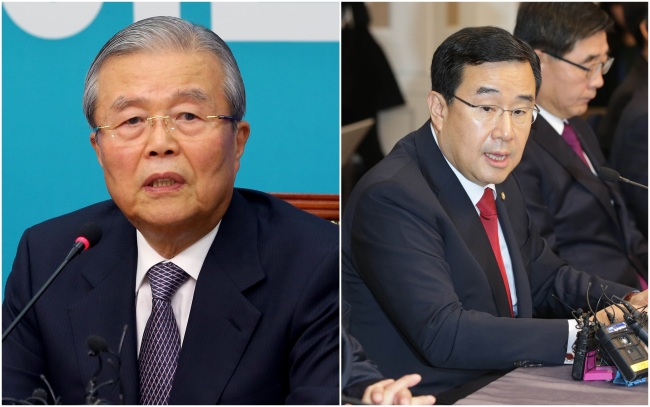South Korea will elect new National Assembly members in a general election on April 13. The Korea Herald is publishing a series of articles on the candidate agendas, election trends and notable runners leading up to the race. This is the fifth installment. — Ed
As evident from self-scorning buzzwords such a “hell Joseon,” the ever-widening social polarization has led to aggravating public discontent, posing a major challenge to political parties ahead of the April general elections.
Their respective response has been different, depending on their stake.
The ruling conservative Saenuri Party claims that such a social gap can be reduced only by promoting growth and creating new jobs. The Minjoo Party of Korea, on the other hand, underlined the importance of fair opportunities, blaming the Park Geun-hye government for unfair distribution of wealth and benefits.
 |
| The Minjoo Party of Korea’s interim leader Kim Jong-in (left) and the ruling Saenuri Party’s policy committee chairman Kim Jung-hoon speak at their respective party meeting on Wednesday. Yonhap |
“The party’s No. 1 election campaign is the creation of new jobs,” said the Saenuri‘s policy committee chief Rep. Kim Jung-hoon last week, upon announcing the party’s election pledges.
The president, too, has repeatedly called for a set of legislations to boost the employment rate.
“We are all well aware that when the economy has met a growth limit, the answer is to turn attention to new industries which may create hundreds of thousands of new jobs for our youths,” Park said Tuesday in a meeting with service industry officials.
She thus added pressure on the National Assembly to pass a series of pending bills on economic revitalization and labor reforms, which the opposition circles saw as infringing on workers’ rights and favoring employers’ interest.
Cheong Wa Dae and Saenuri had every reason to put employment at the top of its economic agenda.
The nation’s general employment rate, which the Park administration pledged to pull up to the 70 percent mark, stood in the mid-60 percent range over the past three years. Such underachievement was a key example of “economic maladministration” asserted by the opposition camp.
While the presidential office and ruling party struggled to pursue their employment vision, the Minjoo Party countered that a blind pursuit of growth cannot be a universal solution to economic polarization.
“Our goal is to build a virtuous circle so that the excessive profits of conglomerates may be distributed evenly to smaller firms and to households,” said the party’s election policy chief Lee Yong-sup last week.
His plans included the establishment of a presidential committee to solve inequality, the gradual increase of minimum wages and strengthened regulations on conglomerates.
Also, the party’s interim leader Kim Chong-in, who formerly served as the president’s economic advisor, has been focusing on pointing out the government’s economic underachievements.
“The point of the April 13 elections will be to judge the economic failure of the Saenuri administration over the past eight years,” Kim said Wednesday at a party meeting.
”The president, who is short of a proper understanding on economic circumstances, is continuing to mislead the people.“
Kim, who drafted the idea of economic democratization back in 2012, also stressed that the key task for the South Korean economy is to create a fair distribution system, criticizing the Saenuri’s quantitative growth initiative.
By Bae Hyun-jung (tellme@heraldcorp.com)

